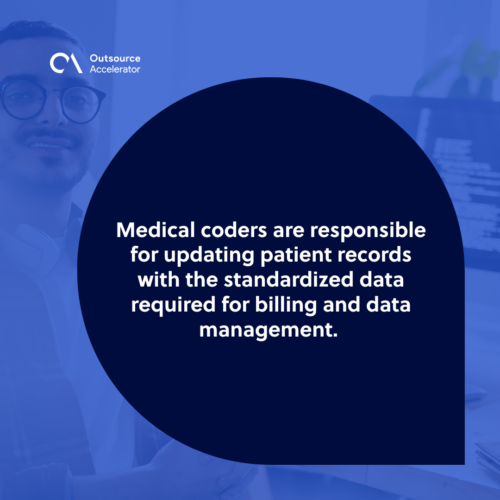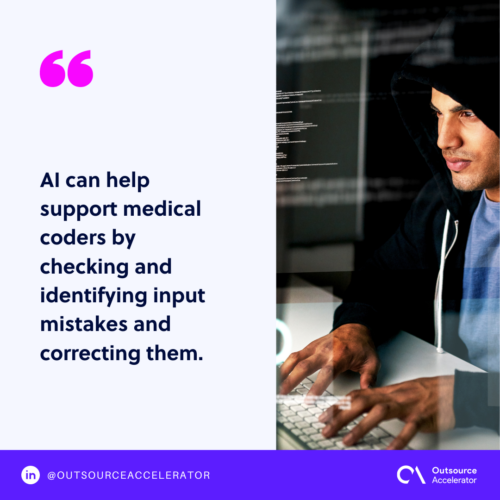What does the future of medical coders look like

Decades ago, a career in health information management required a lot of paperwork. Fast forward to now, and it is no longer the case. Adopting automated health records is fundamentally altering the field of information management.
The transformation has its own advantages and disadvantages. Automation in the healthcare industry is an advantage as it creates a plethora of new career prospects, especially in medical coding and billing.
Is it safe to say that the future of medical coders looks bright? Read on to find out.
What do medical coders do
Medical coders are responsible for updating patient records with the standardized data required for billing and data management. Each diagnosis and procedure must have a code given to it each time a doctor, nurse, or other healthcare worker provides a service.
When patients need their insurance company to pay a claim, these codes will be useful, and accurate coding will help guarantee that the insurer pays the provider promptly.
The difference between medical billing and coding
Medical coding and billing are two distinct professional duties. While larger institutions may hire separate billing and coding specialists, some offices may just have one employee do both roles.
If the work is split into two jobs, the medical coder will be primarily responsible for updating patient health records and ensuring that they are correctly coded.
On the other hand, the medical biller will be responsible for filing claims with insurance companies and handling any necessary follow-up.
But many are becoming concerned about the rise of digitalization and how it impacts actual workers. The development of automation and machine learning justifies a large portion of this concern.

Will AI affect the future of medical coders
In some cases, today’s technology has cleared the need for healthcare establishments to hire workers to perform routine tasks. This raises the question–will computer-assisted coding take the place of trained coders?
Many people who study medical procedure codes worry that with the speed at which technology is developing, they may eventually lose their careers. Artificial intelligence (AI) may take the place of people in their positions.
Will AI take over human skills and appropriate medical coding training?
How can AI help ease a medical coder’s work
While the rise of AI is considered a threat to entry-level work, it should not always be the case for clinical documentation. In fact, AI can even ease the way medical coders work and make them more efficient.
Here are some ways machine learning and AI can help medical coders.
AI helps identify errors
There are a few key reasons why some people might think that computer-aided coding is more of a possibility now than it has been in the past years.
For one, the healthcare industry made a major switch to electronic health records, allowing computers to quickly scan through text, identify keyphrases, and translate them into codes.
It is effective and it works, but there are some problems. In principle, everything should work as intended, but no matter how exact the input specifications are, human error is always a possibility.
For example, the titles of common conditions could be left out during data entry if they are unrelated to the primary cause. This would add to the workload, and there is no assurance that the coder would be able to capture every possible instance.
In the end, the coding would be incorrect and result in widespread confusion when presented to the insurance provider.
AI can help support medical coders by checking and identifying input mistakes and correcting them.

AI streamlines the medical coding process
The medical coding job, when done manually, is challenging and demands a huge number of workers since there are only so many accounts every employee can manage efficiently.
This is part of the reason that the sector has observed countless instances of inaccuracy due to costly blunders made while trying to stay up with the ever-increasing new codes being set.
With this being said, coders should embrace the technical developments now and in the future. It shouldn’t be necessary for subject matter experts to labor on simple charts for hours each day.
Instead of manual labor, retrieving and manipulating information in medical billing can help coders save time and boost their productivity. More so, it can also help them come up with better decisions regarding the next steps in denial resolutions.
The future of medical coders is forecasted to grow
It is safe to say that medical coding will continue to be in demand in the coming years.
The healthcare sector is already being impacted by technology, which is making difficult work simpler than before. While some components of the job continue to be automated, actual work from medical coders will still be required.
In the end, artificial intelligence will support coding staff as it helps streamline medical billing workflows and strengthen medical coding accuracy.
AI can also significantly improve patient communications, specifically in terms of payment collection and appointment scheduling. In turn, this can help medical establishments to nurture their relationships with their patients.
Nevertheless, the greatest medical coders are still people.







 Independent
Independent




